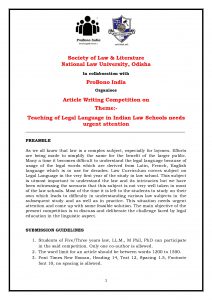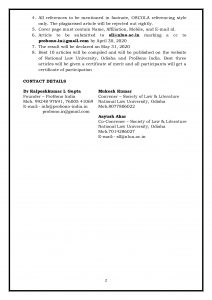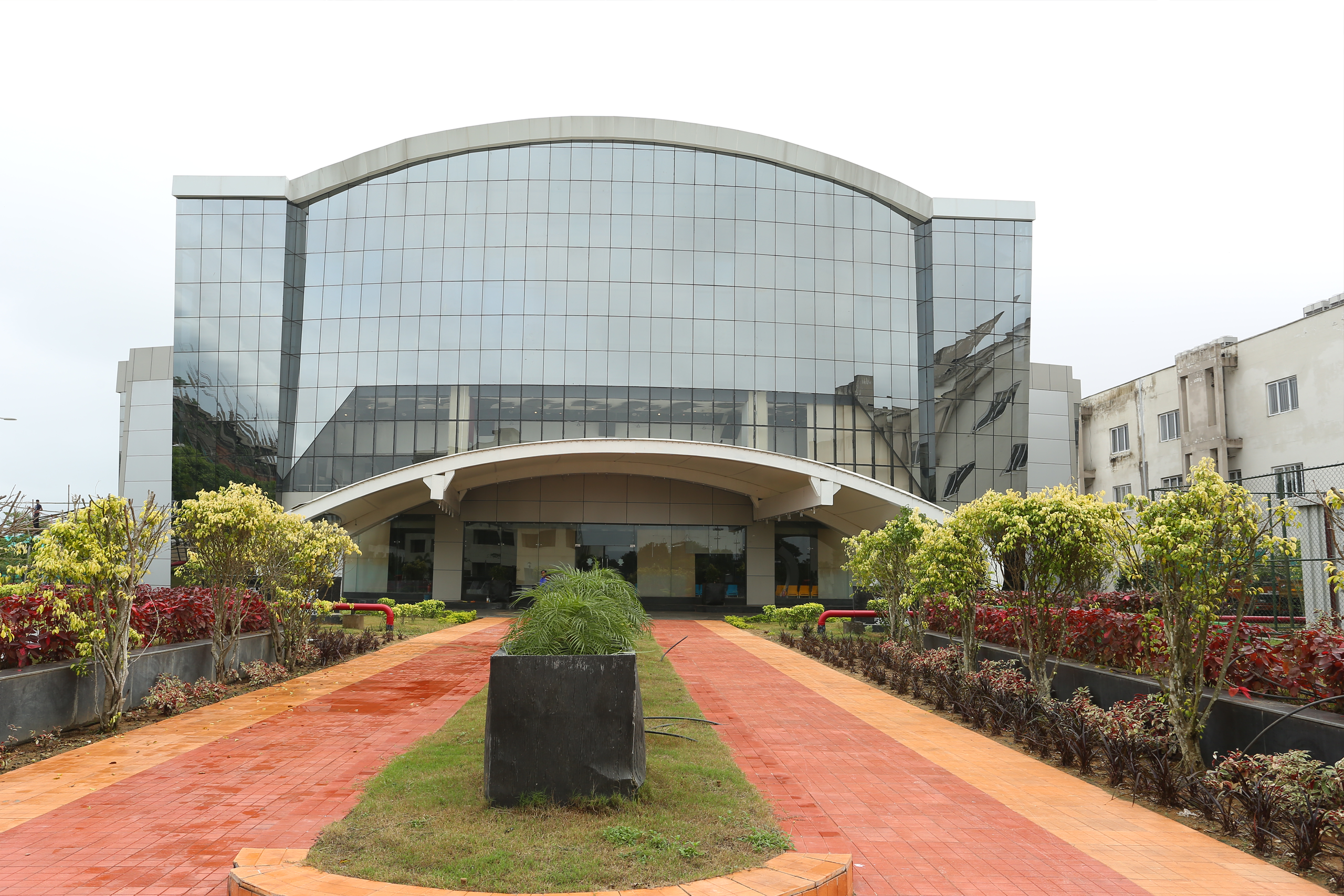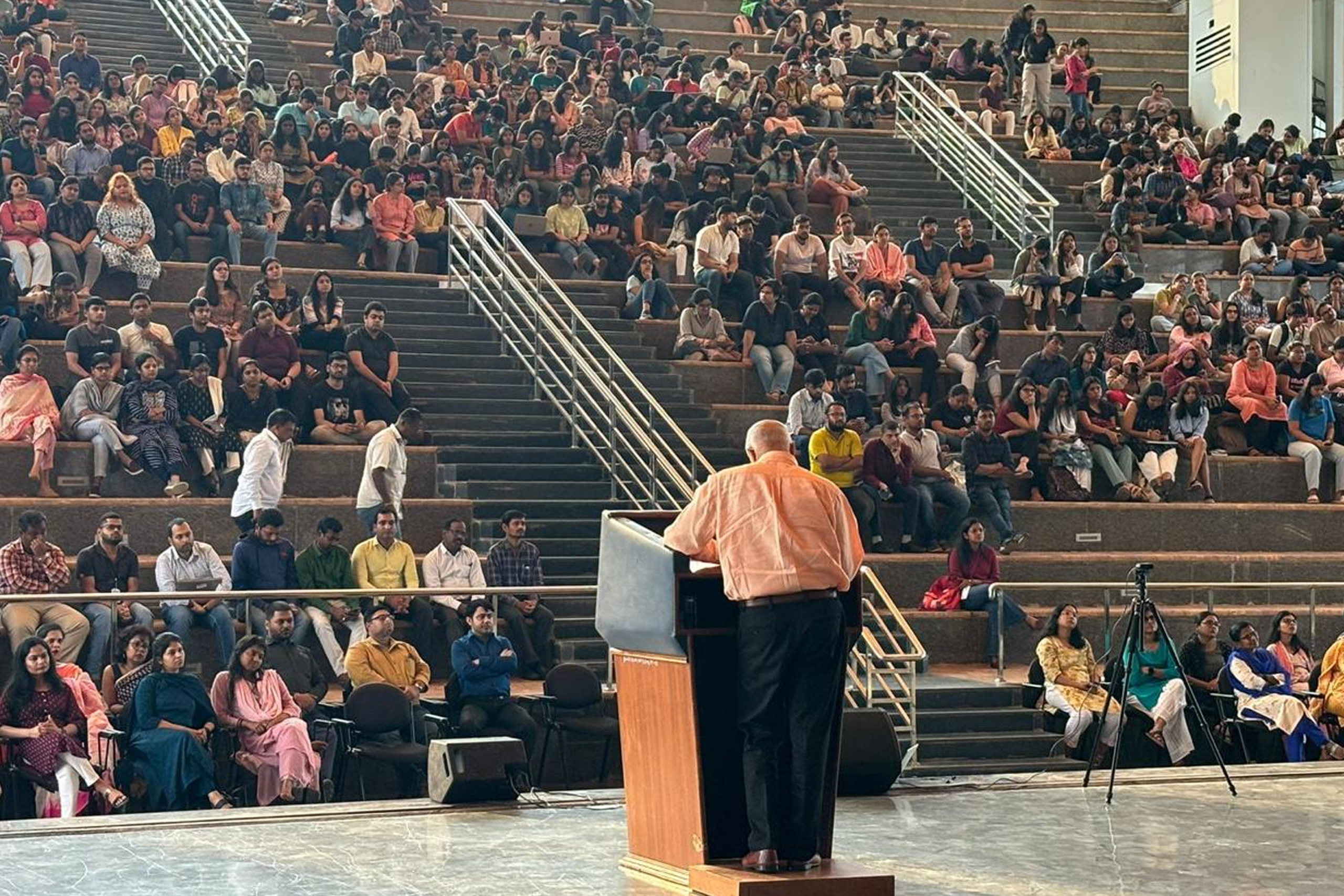News Category: News
“Article Writing Competition in collaboration with ProBono India”.
21 Mar 2020
Article Writing Competition in collaboration with ProBono India
The Society of Law and Literature, National Law University Odisha, Cuttack is pleased to announce its first collaboration?ith?roBono India with regards to the Article Writing Competition on the tentative theme?strong>”Teaching of Legal Language in Indian Law Schools needs?/strong>Urgent?/strong>Attention”.
ProBono India is India’s first platform?hat?tarted in 2016?nd?hich focuses on highlighting all legal aid and awareness activities around the world on one platform.?t is a platform which provides free legal aid service to serve the needs of people. The objective of the organization is to provide legal aid, conduct legal awareness activities, disseminate legal aid,?romote?egal awareness activities of various organizations of the world and conduct research?n?ll aspects of legal aid and legal awareness.
The Society of Law and Literature, National Law University Odisha, Cuttack was established in the year 2020. The objectives of the Society are to create an atmosphere where literature is to be read and promoted through artwork, theatre, article writing, articl</book review, film making, street play and the analysis of the literary aspect of judgments, to publish a cumulative research paper inclusive of new findings and the emerging topics by bridging the gap between literature and law and to create a forum where literary activities can be conducted and promoted.
OBJECTIVE OF THE COMPETITION
As we all know,?aw is a complex subject, especially for laymen. Efforts are being made to simplify the same for the benefit of the larger public. Many a time it becomes difficult to understand the legal language because of?he?sage of?egal?argon?hich is derived from Latin, French?nd?nglish languages and?hich?re?n use for decades.?he?aw Curriculum covers??ubject on Legal Language in the very first year of study in??aw school. This subject is?f?tmost importance?o understand the law and its intricacies but we have?bserved?hat this subject is not very well?eceived by students?n most law schools. Most of the time it is left to the students to study on their own which leads to difficulty in understanding various law subjects?hile?ubsequent study,?s well as,?n practice. This situation needs urgent attention and?e can?ome up with some feasible solutions. The main objective of?his?ompetition is to discuss and deliberate the challenges?aced by legal education in the linguistic aspect.
SUBMISSION GUIDELINES
- Students of Five/ThreeYears’?aw, LL.M., M Phil, PhD can participate in the said competition. Only one co-author is allowed.
- The word limit for an article should be between 1200 to 1500words.
- Font typeshould be?imes New Roman, Heading size is?4, Text size is 12, Spacing is 1.5, Footnote is?ize?0, and no spacing is allowed.
- All referencesare?o be mentioned in?he?ootnote?nd using?SCOLA referencing style only.?ny?lagiarised article will be outrightly?ejected.
- The cover page must contain Name, Affiliation, MobileNumber, and E-mail?D.
- Articleis?o be submitted to?strong>sll@nluo.ac.in?arking a cc to?strong>probono.in@gmail.com?y April 30, 2020.
- The result will be declared on May 31, 2020.
- 10best?rticles will be compiled and published on the website of National Law University, Odisha and ProBono India.? of the best?rticles will be given a certificate of merit and all participants will get a certificate of participation.
Society is hoping for a good response from the students of the University itself.
With Best Wishes,
Aayush Akar, Co-Convenor,
Society of Law and Literature,
National Law University Odisha, Cuttack?/p>
http://probono-india.in/update-detail.php?id=39?/p>
http://probono-india.in/update.php
?a href=”https://www.nluo.ac.in/wp-content/uploads/2020/03/NLUO-ProBono-India-Comp-Details-page-001.jpg” target=”_blank” rel=”noopener”>

“Kartavya-1st NLUO-SMC State Level Video Making Competition | Dates Extended”.
20 Mar 2020
Kartavya- 1st?LUO-SMC State Level Video Making Competition
Theme: Fundamental Duties
?/span>
The Competition is open for all Undergraduates and Post-Graduate students?rom any recognized?strong>University/Colleges across the state of Odisha.
“Sh Arun Bothra (IPS, 1996), Managing Director of Capital Region Urban Transport, Bhubaneswar delivered a talk on “Forensic Science and its use in Criminal Justice Delivery System”.
03 Mar 2020
“Sh Arun Bothra (IPS, 1996), Managing Director of Capital Region Urban Transport, Bhubaneswar delivered a talk on “Forensic Science and its use in Criminal Justice Delivery System”.
On 29 February 2020, NLUO welcomed Sh Arun Bothra (IPS, 1996) who is presently Managing Director of Capital Region Urban Transport, Bhubaneswar. He delivered a talk on “Forensic Science and its use in Criminal Justice Delivery System” for the students of 2018 batch. Mr Bothra shared practical insights into the collection and usage of forensic evidence in criminal investigation and trial through live cases investigated or supervised by him including the Jnaneshwari Express derailment, Netai Killings and Patnagarh Blast Case. The audience was enthralled by his down to earth nature and erudite approach and benefited immensely by learning about actual techniques of evidence collection including DNA samples, handwriting comparison, voice match, electronic evidence and the utility of having forensic evidence in addition to oral or other evidences in a criminal trial.
“NLUO Conducted Second Institution’s Innovation Council (IIC) Meeting on 28th February 2020”.
02 Mar 2020
NLUO Conducted Second Institution’s Innovation Council (IIC) Meeting on 28th February 2020.
The Second Institution’s Innovation Council (IIC) meeting was held in the Conference Hall of NLUO on 28th February 2020 at 2.30 pm. In the meeting, Mr. Sharad Sagar, the Founder and CEO of Dexterity Global, from the faculty side Mr. Mayank Tiwari, Ms. Sudatta Barik, Ms. Anurupa Chetia, Ms. Arjyalopa Mishra, Ms. Rujitha TR, Ms. Madhubrata, Ms. Megha Sadhu were present. Along with them the student members of IIC present in the meeting.
In the meeting, the students who were winner in the 11th Young India Challenge 2020 held at Bhubaneswar presented their Idea regarding to create a Green straw which is cheap and organic. They used a variety of wild grass created by crossing multiple variations of the same. It is hollow and linear in shape. Since it is wild grass, it needs no special care and can be grown on the borders between different farmlands. Thus, they reduced their land cost to zero. After their presentation, Mr. Sharad Sagar, suggested some very pertinent fruitful changes to be made in their proposal by stating that they should focus on the cost analysis part and rework on it. Ms. Arjyalopa Mishra, Assistant Professor of Law, National Law University Odisha, suggested that the students should take the suggestions provided by Mr. Sharad Sagar, and make the necessary changes as required and she also, suggested that they should rework on the cost of manufacturing part. At last Mr. Mayank Tiwari, National Law University, Odisha, stated his gratitude for such a good discussion and fruitful suggestions to the students for implementing their ideas for moving forward in the path of this great initiative undertaken by them. The Sessions was closed.
“Advertisement for Vacant Position in the ICSSR-IMPRESS Research Project (P2778)”.
02 Mar 2020
No content available
Centre for Maritime Law, National Law University Odisha organized its 1st International Conference on Maritime Law, 2020
28 Feb 2020
National Law University Odisha marked a two-day event of India’s first International Conference on Maritime Law, 2020 in collaboration with Paradip Port Trust and HP Law Associates, Mumbai on 22nd– 23rd February, 2020. Established in 2015, Centre for Maritime Law, NLUOhas been working with the objective of promoting research & excellence in the field of Maritime Law. Twenty-first century has been undergoing a sea-change and the need foran academic discussion cannot be understated. In the light of changing relations and emerging challenges in Maritime, there is a need to align our lawswith aparadigm shift. The Conference majorly focused on “Reshaping the New Horizons: Maritime Law Perspective in 21st Century”as its main theme.
The Conference got off the ground by the graceful presence of Mr. Subrat Tripathy, CEO of the Dharma Port Co. Ltd., who put emphasis on the co-existence of ‘innovation and mankind’. Mr. Tripathy emphasized on the need of the seas globally by stating that “Uniquely, oceans belong to the mankind, and shouldn’t be categorized as the assets to the countries”.
Presentation of 24 papers were scheduled across four sessions in total during the course of the Conference which remarked participation of students and academicians all across the reach. Presence of eminent stalwarts such as Prof. (Dr.) Proshanto Mukherjee, Capt. Ashok Mahapatra, Mr. Anil Devli, Prof. (Dr.) Tony George, Mr. Mayank Suri,Mr. Hari Narayan, Mr. Prathamesh Kamat, Mr. Sudipta De Sarkar blessed the event as panellists to the participantswith plethora of knowledge and encouragementto embark a change to the Maritime field.
Limelight of the Conference can be defined by the presence of Shri Amitabh Kumar, Director General of Shipping, Ministry of Shipping, Government of Indiain the valedictory session to felicitate the winners of the Conference.The Centre also launched its book titled“Through the lens of Maritime Law: A world view”to visualise the need foran extensive grasp on various national and international aspects of Maritime Law.
Devika Radha of Symbiosis law School, Pune took home the title of Best Presentation as well as Best Paper with an exceptional outlay of participation. Sanjana Hoque of South Asian University, Delhi and Syed Owais Tallib & Sai Rishikesh Reddy Yenumula of DSNLU, Vishakhapatnam bagged the prize of second-best research paper and second-best presentation respectively.
The success of the Conference is also extended to Paradip Port Trust, HP Law, Adani Ports & Logistics, JM Baxi Group, Campbell Johnston Clark, United Maritime Law Chambers, Eastern Book Company Publishing Pvt. Ltd. and to the family of Late Shri Samareshwar Mahanty. All in all, the Conference was a huge success!
The Intellectual Property Analysis and Advocacy Centre (IPAAC), NLUO organized a Workshop on Intellectual Property Rights Management and Awareness in collaboration with CIPAM
28 Feb 2020
The Intellectual Property Analysis and Advocacy Centre (IPAAC), under the aegis of Hon’ble Vice Chancellor Prof. (Dr.) Shri Krishna Deva Rao and the Registrar (I/C) Dr. Yogesh Pratap Singh, successfully organized a Workshop on Intellectual Property Rights Management and Awareness in collaboration with CIPAM (Cell for IPR Promotion and Management), Department of Promotion of Industry and Internal Trade. Held during the course of 2 days, 5 esteemed practitioners in the field of Intellectual Property Rights addressed the students of National Law University Odisha to give them the required practical knowledge about the field and the practice.
Mr. Shubham Istrewal (Assistant Manager, CIPAM), Dr.Prithipal Singh (Assistant Controller of Patents and Designs), Ms. Sukku (Senior Patent Associate, SS Rana & Co.), Mr. Vikrant Rana (Managing Partner, SS Rana & Co.), Mr. Rajiv Suri (Partner, RNA Technology and IP Attorneys) were the respected resource persons for this Workshop. They covered various aspects of IP Rights including but not limited to Patents, Trademark, Copyrights, Designs and Commercialization of Intellectual Property Rights.
The event kicked off with the first session primarily focussing on the IPR Regime observed in India and the initiatives taken by Government in furtherance of one of the country’s primary goals which is to protect the IP Rights in India. Mr. Shubham Istrewal, being the Assistant Manager of CIPAM, was also in the best position to explain the role of CIPAM in order to extend help to the Government for this purpose. The second session was taken by Dr.Prithipal Singh who encapsulated the recent trends this country has witnessed in terms of patent, copyright and trademark applications signalling towards a higher rate of protection of IP Rights. He also spoke extensively about the changes which have happened in filing and grant process of these IP Rights. Ms. Sukku was then called upon to profess the budding lawyers about the existing practice of patents. Being someone who has been in the advocacy process of Patents, she chose to speak about the drafting and the procedure observed in Patent Application and Examination thus providing an outlook to the students which is not just textual but practically applicable. Mr. Vikrant Rana then took up the theme of designs, its registration process and the overlap of designs with other Intellectual Property Rights. The audience kept the esteemed speakers engaged with insightful questions into the practice throughout the first day.
On the second day, we welcomed Mr. Rajiv Suri on the dais for imparting his knowledge on Trademarks. He spoke in detail about Trademarks; its origin, its requirements, its importance, application procedure, objections thus covering end-to-end aspects of the subject. He gave recent examples of Trademarks infringement which really engaged the audience to be more involved in the session. Mr. Shubham Istrewal then concluded the Workshop by professing on the Commercialization of Intellectual Property and how it is a valid part of the management of IP Rights. The session covered important aspects such as specific contractual terms in the agreements, ownership aspect of the Intellectual Property, its transfer and the importance of confidentiality and partnerships.
The event was very popular among students as it gave an insight into the practical application of the knowledge they are gaining theoretically. This practical knowledge would be extremely beneficial for them if they choose Intellectual Property Rights as a field of profession. In the end, IPAAC thanked the Dignitaries for gracing us with their knowledgeable personas and were willing to share their invaluable knowledge. CIPAM was extremely helpful to IPAAC in organizing this session and this workshop would not have been a success had it not been extreme co-operation from CIPAM. This Workshop helped the students to broaden their horizons for both knowledge and scope for future employment in the field of IPR.
The Centre for Competition Law and Policy organised CCI-NLUO Competition Advocacy Workshop
28 Feb 2020
The CCI-NLUO Competition Advocacy Workshop was conducted on 22nd February. A resource person from the Competition Commission of India, Ms. Jyotsana Yadav, was present to conduct the workshop. The workshop was divided into three sessions – 1) Introduction to Competition Law, 2) Cartel Enforcement and Leniency Sheme – Case Study, 3) Abuse of Dominance. The case study session was a lively and engaging moment between the students and the resource person as practical incidents were presented to them and they were made to apply the knowledge attained by them during the session to try and solve the problems. At the end, students were allowed to ask Ms. Yadav whatever they wanted to know about making a career in competition law and Ms. Yadav encouraged feedback from the students on the session. On the whole, it was a productive afternoon for both, Ms Yadav as well as the participants.
“Application for Fulbright program for 2020-21”
22 Feb 2020
No content available
“NOTICE Inviting Tenders for Upgradation of Cyberoam CR1000 iNG XP and allied works”.
15 Feb 2020
No content available





